
Aryabhata or Aryabhata I was the first of the major mathematician-astronomers from the classical age of Indian mathematics and Indian astronomy. His works include the Āryabhaṭīya and the Arya-siddhanta.
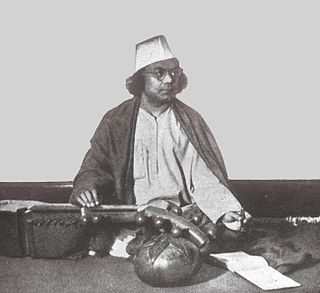
Kazi Nazrul Islam was a Bengali poet, writer, journalist, and musician. He is the national poet of Bangladesh. Nazrul produced a large body of poetry, music, messages, novels, and stories with themes that included equality, justice, anti-imperialism, humanity, rebellion against oppression and religious devotion. Nazrul Islam's activism for political and social justice as well as writing a poem titled as "Bidrohī", meaning "the rebel" in Bengali, earned him the title of "Bidrohī Kôbi". His compositions form the avant-garde music genre of Nazrul Gīti.

Mohyal Brahmins are an Indian sub-caste of Saraswat Brahmins from the Punjab region.

The culture of Bengal defines the cultural heritage of the Bengali people native to eastern regions of the Indian subcontinent, mainly what is today Bangladesh and the Indian states of West Bengal and Tripura, where they form the dominant ethnolinguistic group and the Bengali language is the official and primary language. Bengal has a recorded history of 1,400 years. After the partition, Bangladeshi culture became distinct from the mainstream Bengali culture, thus their culture evolved differently, still there are many commonalities in Bangladeshi culture & West Bengali culture which connects them both together as Bengali culture.

Nakshi kantha, a type of embroidered quilt, is a centuries-old Bengali art tradition of the Bengal region, notable in Bangladesh and Indian states of West Bengal, Tripura and part of Assam. The basic material used is thread and old cloth. Nakshi kanthas are made throughout Bangladesh, but the greater Mymensingh, Jamalpur, Bogra, Rajshahi, Faridpur and Jessore, Chittagong areas are most famous for this craft.

Alpana or alpona is a Bengali folk art style, traditionally practiced by women, and consisting of colored motifs, patterns, and symbols that are painted on floors and walls with paints made from rice flour, on religious occasions. Alpona is common to Bangladesh and the Indian state of West Bengal. Amongst Hindu families, alpanas may contain religious motifs with symbolic designs that relate to religious austerity, festivals, and specific deities. Amongst Santal tribal communities, alpanas often contain geometric or symbolic patterns drawn from nature. Although traditionally the domain of rural women, Alpana motifs have been very influential in modern Indian art, and are incorporated into the works of artists such as Jamini Roy, Abanindranath Tagore, Devi Prasad, and in the early illustrations of film-maker Satyajit Ray. In contemporary Bengal, alpanas are created as part of religious festivals such as the Durga puja, in public and private spaces.
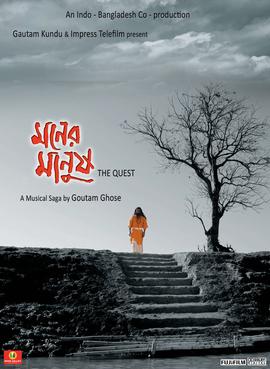
Moner Manush is a 2010 India-Bangladesh joint venture Bengali-language biographical musical drama film based on the life and philosophy of Lalon, a noted spiritual leader, poet and folk singer of Bengal in the 19th century. Directed by Goutam Ghose, who also wrote the screenplay, the film has Prosenjit as the lead actor portraying the character of Lalan Fakir. Paoli Dam plays the character of Komli, the key female disciple of Lalan. Moner Manush has been critically and commercially successful.
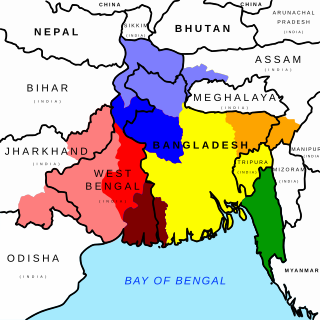
The Bengali Calendar or Bangla Calendar, colloquially, is a solar calendar used in the Bengal region of the South Asia. A revised version of the calendar is the national and official calendar in Bangladesh and an earlier version of the calendar is followed in the Indian states of West Bengal, Tripura and Assam. Unlike the traditional Indian Hindu calendar which starts with the month of Chaitra, the Bengali calendar starts with Boishakh because of the reforms made during the reign of the Mughal Emperor Akbar in Mughal Bengal. The first day of the Bengali year is known as Pohela Boishakh which is a public holiday in Bangladesh.

The Ekkos Clan is a mystery novel written by Indian author Sudipto Das, based on historical research. It was published by Niyogi Books and released in India in July 2013 and officially launched at a function in Bangalore on 3 August 2013.
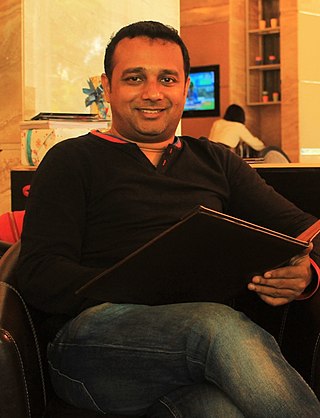
Sudipto Das is an Indian author, social worker and musician. He is also a speaker at TED events and a veteran in the semiconductor industry, having co-chaired the Industry Forum at VLSID 2020. He has been the co-founder of two startups. In 2020 he spearheaded a country wide initiative to deliver daily groceries to people stranded due to lockdowns in the wake of the breakout of COVID-19.

Bartaman Bharat is a Bengali language essay written by Indian Hindu monk Swami Vivekananda. The essay was first published in the March 1899 issue of Udbodhan, the only Bengali language magazine of Ramakrishna Math and Ramakrishna Mission. The essay was published as a book in 1905, and later it was compiled into the fourth volume of The Complete Works of Swami Vivekananda.

Sarathi Socio Cultural Trust is a non profit organization in Bangalore, founded in 2003. The organization is involved in organizing socio-cultural events in Koramangala, the highlight being the grand "Durga Puja", which sees at least 150,000 to 200,000 visitors every year, and which got the "Senco Sharod Samman" award for the best ambiance and crowd management in 2018. In 2020, Sarathi used its funds to help many people, like the idol-makers and others, whose livelihoods were badly impacted due to the pandemic.

The Improv is an improvisational comedy show which was started in May 2012 in Bangalore, India. The show has no script and is totally improvised, as its name suggests. The audiences give suggestions, situations and scenarios to the host and taking the cue, the actors create on-the-spot hilarious scenes on stage. It is hosted and directed by Saad Khan, an Indian filmmaker. The show is conceptualized by Saad Khan. The show's performers are Sal Yusuf, Darius Sunawala, Abel Mathews and Tim Schultz. The team has performed over 100 shows in Bangalore, Hyderabad, Mumbai, Chennai, Dubai, Abu Dhabi and Sweden.

eVidyaloka is a Bangalore-based NGO that focuses on imparting education to students of Rural government schools in India by crowdsourcing volunteer teachers and connecting them to the rural government schools using the power of IT.
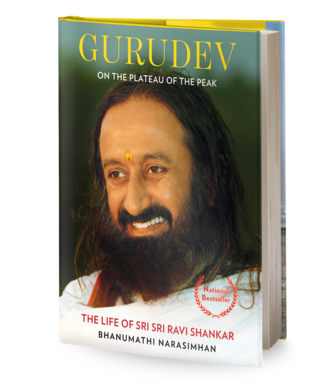
Gurudev: On the Plateau of the Peak is a biography of Ravi Shankar, a spiritual leader and founder of The Art of Living Foundation. The author of the book is his sister Bhanumathi Narasimhan.
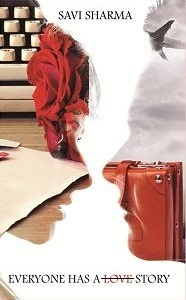
Everyone Has a Story is an inspirational romance novel written by Savi Sharma. This was the author's debut novel and was first published in August 2015. Sharma self-published her book, which quickly became popular and bestselling. Later it was published by Westland publishers. By February 2017 more than 100,000 copies of the book were sold. The recent edition of the book is published by HarperCollins India

The Broken Amoretti (ISBN 9789386906830) is a literary novel written by Sudipto Das and Aparajita Dutta. It's the third novel by Sudipto, published by Niyogi Books and formally released at an event in IIT Kharagpur in July 2019.
T. Richard Blurton is a specialist in South Asian art and archaeology, formerly Assistant Keeper at the British Museum.
RutuChakra is a youth-led organisation which has worked in the field of menstrual hygiene, inclusivity and dignity, predominantly in India since 2018. Through its 20+ chapters across India, it has provided over 200,000 menstrual products to underprivileged persons. The organization has been active throughout the COVID-19 pandemic, donating more than 50,000 products as of 2020. The organisation depends on several crowdfunding channels to raise funds for its activities. RutuChakra collaborates with Non-Governmental Organisations such as ThayiMane, Mitra Jyothi and Sandesh to provide sanitary napkins and workshops. For its work, the founder has received several accolades including the Renaissance Award.

Jagadish Chandra Bose: The Reluctant Physicist is a contemporary biography of the Indian polymath, Sir Jagadish Chandra Bose, modern India’s first scientist, an eclectic pioneer in radio science, and the father of Plant Neurobiology. Written by the Indian author, Sudipto Das, this marks Das's debut in non-fiction after three novels. Published in November 2023 by Niyogi Books, it was launched in Bangalore at the Bangalore Literature Festival on December 3, 2023, and in Calcutta on January 11, 2024.


















